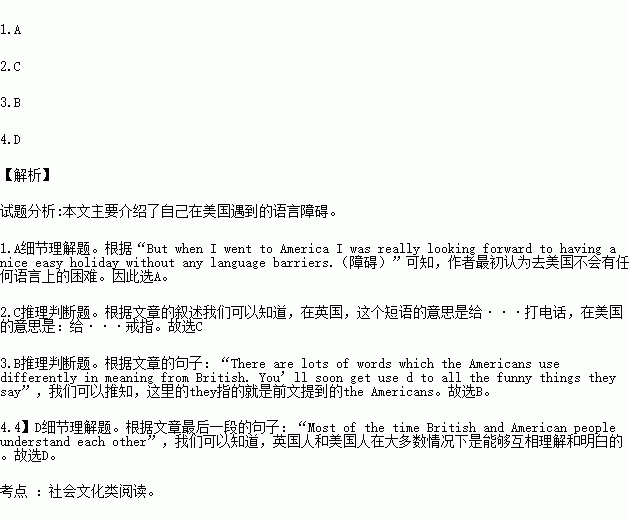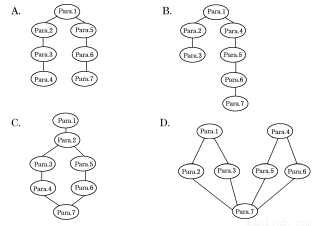题目内容
When I was sixteen years old, I made my first visit to the United States. It wasn’t the first time I had been abroad. Like most English children I learned French at school. And I had often been to France, so I was used to speaking a foreign language to people who didn’t understand English. But when I went to America I was really looking forward to having a nice easy holiday without any language barriers.(障碍)
How wrong I was! The misunderstandings(误解) began at the airport. I was looking for a public telephone to give my American friend Penny a call and tell her that I had arrived. A friendly old man saw me looking lost and asked if he could help me.
“Yes,” I said, “I want to give my friend a ring.”
“Well, that’s nice,” he said. “Are you getting married? But aren’t you a bit(点) young?”
“Who is talking about marriage?” I replied. “I only want to give my friend a ring to tell her I’ve arrived. Can you tell me where there’s a phone box?”
“Oh!” he said, “There’s a phone downstairs.”
When at last we met, Penny explained the misunderstandings to me.
“Don’t worry,” she said to me. “I had so many difficulties at first. There are lots of words which the Americans use differently in meaning from British. You’ll soon get used to all the funny things they say. Most of the time British and American people understand each other!”
1.At first the writer thought _____ in America.
A. he wouldn’t have any language difficulties
B. he would not understand the Americans
C. the Americans might not understand him
D. it wouldn’t be an easy and relaxing holiday
2.From the passage we can see that “give somebody a ring”_____.
A. means the same in America as in England
B. means “call somebody” to the American people.
C. has two different meanings
D. means “be going to get married” in England
3.In the last paragraph, the underlined “they” refers to(指的是) _____.
A. the old man and the boy B. the Americans
C. the British D. the French
4.Penny will agree with the idea that _____.
A. Americans use words entirely(完全地) differently from British
B. Americans speak in a funny way
C. It will be hard for the author(作者) to get used to American English
D. Americans and British can understand each other in most cases(情况)
 名校课堂系列答案
名校课堂系列答案书面表达
假设你是李华。你的美国笔友Susan要在暑假来中国桂林参加一个文化交流活动。 她想提前了解一下这座城市的相关情况,写信向你询问,请根据以下提示信息,给她回一封信。
自然情况 | 位于中国的南部,气候温和,风景优美 |
景点 | 四面环水,七星公园,漓江,象鼻山等 |
美食 | 桂林米粉,辣椒酱 |
...... |
注意: 1. 词数100左右,开头和结尾已经给出,但不计入总数;
2. 可适当增加细节,以使行文连贯;
3. 参考词汇 象鼻山 Elephant Trunk Hill chilli sauce
Dear Susan,
I’m glad that you are coming to Guilin for an exchange program during the summer holiday.
_________________________________________________________________________________________
_________________________________________________________________________________________
_________________________________________________________________________________________
_________________________________________________________________________________________
_________________________________________________________________________________________
_________________________________________________________________________________________
Yours
Li Hua



